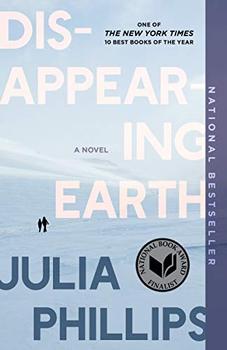Summary | Excerpt | Reading Guide | Reviews | Beyond the book | Read-Alikes | Genres & Themes | Author Bio

On the remote peninsula of Kamchatka—tucked away on the far eastern corner of Russia and surrounded by vast seas and oceans—most people feel safe. But when two young sisters, Alyona and Sophia, vanish on a cool August afternoon, things change, shocking the small, interconnected Kamchatka community.
In 12 chapters, corresponding with the months of the year following the disappearance of the two girls, author Julia Phillips zooms in on a rotating set of characters who are impacted by the case, providing a panoramic view of the peninsula's people. Since each chapter inhabits the perspective of a different person, Disappearing Earth is far from a traditional thriller. The investigation and crime often take a backseat. Just as many people don't think twice about a crime featured on the nightly news, some characters view it only peripherally, in passing. For others, the case is a gravitational force, driving their entire lives off-kilter. This makes the mystery somewhat impressionistic, as details are revealed slowly, indirectly, unexpectedly, scattered throughout the chapters of the book and the lives of those in Kamchatka, until the story finally comes to a head.
Among the revolving characters are detectives, eye witnesses, mothers, victims, students, city workers, neighbors and friends. With transportive, immersive prose, Phillips synthesizes their world, creating something that is sharp and clear. Characters pop with "swollen cheeks, sun-bleached eyebrows, yellow hair that stuck up in back like the quills of a hedgehog." Places materialize with "steamed-up windows [that] blotted out any stars, so the night beyond looked flawlessly dark." These potent images sustain readers as characters pivot in and out of one another's storylines, making an immersive experience out of something that could be disorientating.
In addition to being well-executed and fitting for the storyline, Phillips' narrative structure enables her to delve into the complex, delicate and long-brewing sociocultural nuances of Kamchatka. In this post-Soviet country, tensions rise and fall between the immigrant, white, and Indigenous peoples (see Beyond the Book). Inhabitants of an ever-changing nation, these individuals struggle to find a balance between the conflicting values of traditional and progressive ways of life—in their families, in their sex lives, in their relationships and beyond. Characters are scattered across economic classes, too, providing insights into the burdens and opportunities that come with wealth or poverty. Phillips is able to tap into all of these varied nodes on culture and society that surface through her characters' plot lines, focusing most on the lives of women, for they feel the tragedy of the missing girls most deeply.
Phillips' 5-year residence in Russia on a Fullbright grant likely facilitated this culturally-sensitive, well-researched novel. Although Kamchatka has around 400,000 residents, the region's population density is one of the lowest in the world. It is foreign; it is a place few people will ever experience for themselves, due to extreme political and geographic isolation. Yet somehow, Phillips balances the familiar with the strange. This very specific place and very specific culture has some striking similarities to the rest of the world—political distrust, communication barriers, familial pressures and immigration disagreements. And the root of the story, the vanished Alyona and Sophia, reveals more about the universality of tragedy than what first meets the eye.
A truly impressive debut novel, Disappearing Earth is a must-read. Being relatively short, it begs for a re-read right after spinning through the final page. Striking a balance between immersive fiction and realistic contextual elements—in geographic accuracy, cultural attentiveness and more—there is something here for every reader. To learn more about Phillips' take on storytelling, listen to her conversation with Noah Finco on the podcast One Thing Led to Another.
![]() This review was originally published in The BookBrowse Review in May 2019, and has been updated for the
April 2020 edition.
Click here to go to this issue.
This review was originally published in The BookBrowse Review in May 2019, and has been updated for the
April 2020 edition.
Click here to go to this issue.

If you liked Disappearing Earth, try these:

by Leo Vardiashvili
Published 2025
Amid rubble and rebuilding in a former Soviet land, one family must rescue one another and put the past to rest: a stirring novel about what happens after the fighting is over

by Hayley Scrivenor
Published 2023
In Hayley Scrivenor's Dirt Creek, a small-town debut mystery described as The Dry meets Everything I Never Told You, a girl goes missing and a community falls apart and comes together.
Your guide toexceptional books
BookBrowse seeks out and recommends the best in contemporary fiction and nonfiction—books that not only engage and entertain but also deepen our understanding of ourselves and the world around us.